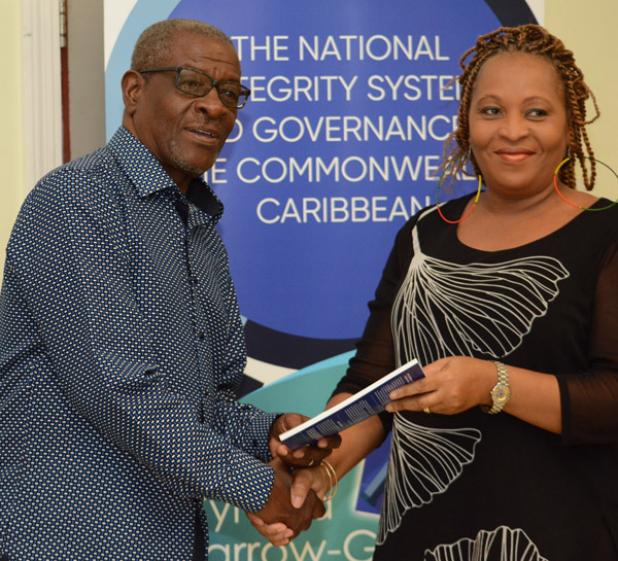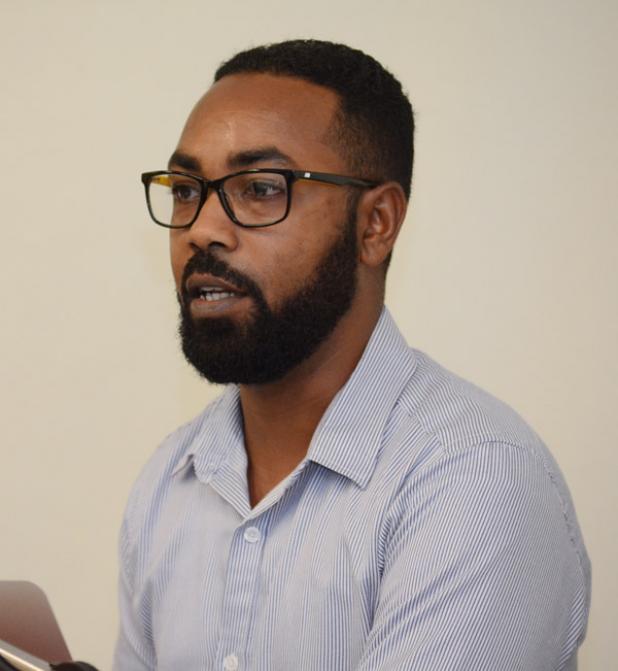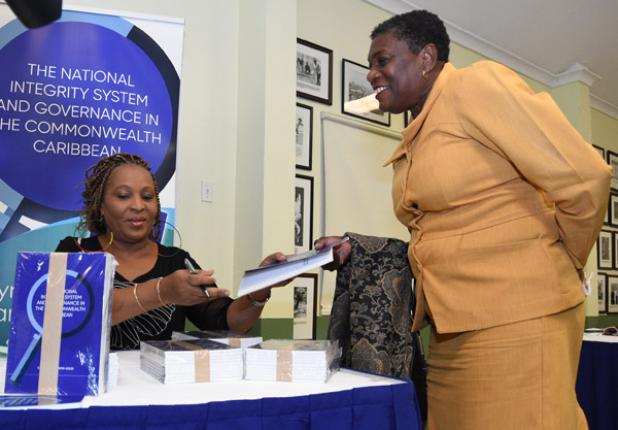
Former Prime Minister of Dominica, Edison James, while offering congratulations to author Cynthia Barrow-Giles on the launch of her new book ‘The National Integrity System and Governance in the Commonwealth Caribbean’, was presented a copy of the book on Monday night.

Lecturer at the UWI and PhD research student, Josh Drayton, delivered a review of the 14-chapter book.

Author Cynthia Barrow-Giles (left) signs a copy of her book ‘The National Integrity System and Governance in the Commonwealth Caribbean’ for senior librarian at the National Library Service, Loleta Parris.
Bring corruption to light
ALL forms of corruption must be rooted out.
This is the view of senior lecturer in Political Science at the University of the West Indies Cave Hill campus, Cynthia Barrow-Giles, who tackled the issue of corruption across the region in her new book, “The National Integrity System and Governance in the Commonwealth Caribbean”.
The launch of the book was held in the 3Ws Pavilion of the Cave Hill campus on Monday night and as the outspoken senior lecturer explained, it is an expanded collection of newspaper articles on the state of play of the system. She said while the book is not about corruption per se, it focuses on the potential for corruption given the broad institutional weakness of governance arrangements and the need for a new approach to address the issue.
“How do we really begin to control corruption when there is widespread belief that bribe giving and taking by ordinary citizens is acceptable? It is unlikely that any policy, which is aimed at reducing the incidence of corruption, will be effective if the majority of the population is characterised by a level of acceptance corrupt behaviour,” she argued.
The author, who acknowledged it is an uncomfortable topic to address, told those in attendance that the impression is that the region is practically corruption-free. However, she drew reference to the Transparency International 2017 Report on People and Corruption: Citizens’ Voices from Around the World, which shows that one in nearly every four public service users paid a bribe annually, while the average bribery rate in the Caribbean is placed at 29 per cent. “In other words, the average bribery index for the Caribbean in terms of public service users is higher than the global average,” she stated.
“We may certainly not be some of the most corrupt African or Latin American countries, but we must rebuke the seemingly normalisation of corruption. Where leaders – whether in the public or private sectors – reward, condone, ignore and facilitate corruption; it sends a message to the rest of society.”
Barrow-Giles showed instances in the region where corrupt acts took place, but no one was held accountable or faced prison time. She pointed to other jurisdictions where public officials were not only jailed, but had to return embezzled funds which in some cases ran into the billions.
“Often we turn a blind eye to officials who are engaged in garden-variety theft and focus on larger issues such as that which occurred in the Piarco scandal in Trinidad and Tobago, for instance.”
Barrow-Giles stressed that elected officials should be held to a higher standard. Noting that there are those who do favours for their donors while raking in campaign contributions or gifts. “And they do so with little fear that they might cross the line into illegality.”
She reiterated that the region cannot continue to hold on to the “erroneous yet stubborn” view that corruption is not a problem and that the systems and processes are strong. “When in reality we are defined by potently weak systems and processes dressed up as strength. We need robust institutions and processes. Talking corruption may be harsh and palatable, but it must be done and the first step is to recognise the deficiencies in our National Integrity System and to take urgent steps to plug in the existing gaps,” she said.
Barrow-Giles made the point that studying and reporting corruption presents an enormous empirical challenge to researchers because the corrupt behaviour is typically hidden and unobservable.
“The fact is corruption extends to such practices as fraud, bribery including vote buying, embezzlement, kickbacks, cronyism and extortion. These are in fact crimes and like all crimes, they are difficult to research because those who commit them are not motivated to co-operate with efforts to study them and so information is often buried.”
Offering solutions, she said the first priority to reduce the scale of corruption and preventing its occurrence must be to have institutional processes, which enhance transparency and accountability. This includes strengthening disclosure mechanisms where necessary, providing procedural checks and always minimise the opportunities for unaccountable discretionary and monopoly power.
She said the second priority should be the establishment of strong and effective regulatory regimes. “Investigative agencies which will produce effective policing of the system and thirdly, we must establish and secure a sanctions regime which will act as a clear deterrent.
“When these are in place, and there is still no indictment of politicians and other citizens, then and only then will I capitulate and agree that we are corruption-free. And that will never occur,” she opined. (JH)
